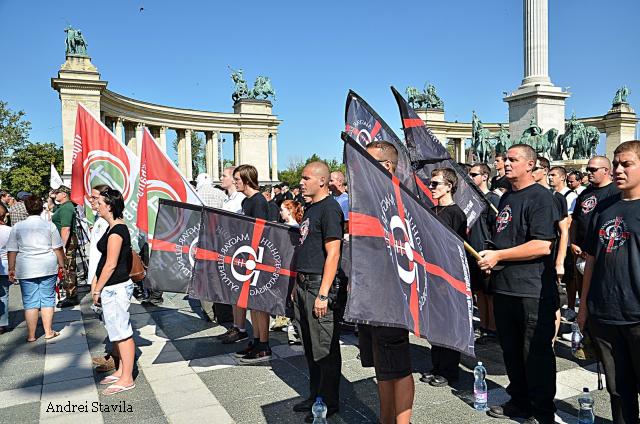Measures Against Hungarian Extremism
The Romanian Interior Ministry announced on Monday that four Hungarian citizens, suspected of carrying out extremist nationalist activities in Romania, are banned from entering the country for a year. The measure, although unusual in that it targets citizens from a neighbouring country, a EU and NATO member, was nonetheless predictable. A week ago, an unauthorized rally staged in the central Romanian town of Targu Mures by a number of Hungarian radical organizations from both Hungary and Romania, spiraled into acts of hooliganism. Although president Traian Basescu has had cordial relations with the ethnic Hungarians, who account for 6% of the country’s population and on whose votes he relied on several occasions, he did not conceal his discontent. He urged the Government to take firm measures against that type of incidents.

Bogdan Matei, 18.03.2014, 13:45
The Romanian Interior Ministry announced on Monday that four Hungarian citizens, suspected of carrying out extremist nationalist activities in Romania, are banned from entering the country for a year. The measure, although unusual in that it targets citizens from a neighbouring country, a EU and NATO member, was nonetheless predictable. A week ago, an unauthorized rally staged in the central Romanian town of Targu Mures by a number of Hungarian radical organizations from both Hungary and Romania, spiraled into acts of hooliganism. Although president Traian Basescu has had cordial relations with the ethnic Hungarians, who account for 6% of the country’s population and on whose votes he relied on several occasions, he did not conceal his discontent. He urged the Government to take firm measures against that type of incidents.
The Supreme Defence Council also discussed the situation, and the solution was announced on Monday. According to the Interior Ministry, there is evidence suggesting that the four are members of structures involved in activities that threaten public order and the national security of Romania. For a year now, the Directorate Investigating Organized Crime and Terrorism (DIICOT) has been conducting a criminal investigation involving several members of the Hungarian far-right party Jobbik, for separatist and revisionist statements that go against Romania’s constitutional order. The third-largest party in Hungary, after the Conservatives and the Socialists, Jobbik may win, according to opinion polls, around 15% of the votes in the parliamentary elections due in April.
Seen as one of the most aggressive xenophobic movements in Europe, Jobbik has a paramilitary arm, set up in 2007 by leader Gabor Vona. According to our correspondent in Budapest, the Hungarian Guard was registered as a cultural association. But rallies of Guard members in black uniforms, in areas inhabited by ethnic Rroma, angered representatives of civil society, so in July 2009 the paramilitary organization was disbanded, at the request of the Hungarian Prosecutor’s Office. Shortly after, it resurfaced under a new name, the New Hungarian Guard, and with slightly different uniforms.
The measures taken by the Romanian authorities are designed to prevent the recrudescence of incidents reminiscent of interwar fascism, in a country like Romania, where xenophobic parties have long been outside Parliament and the Democratic Union of Ethnic Hungarians in Romania has been a member of successive governments ever since 1996.






























